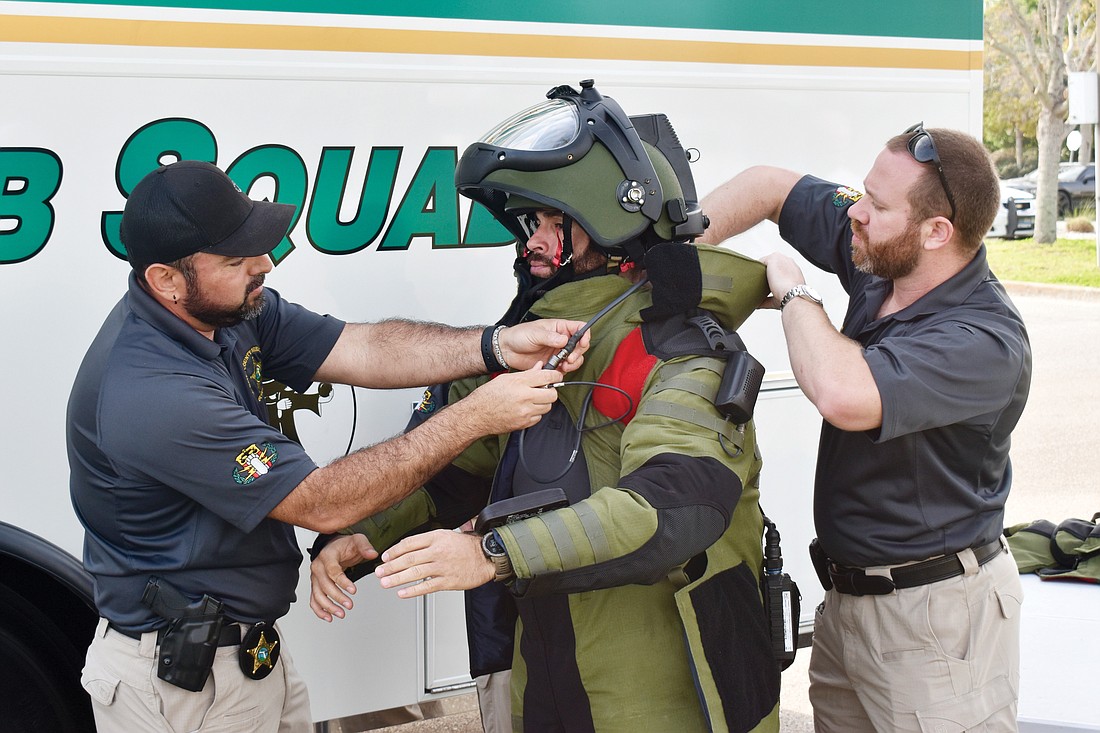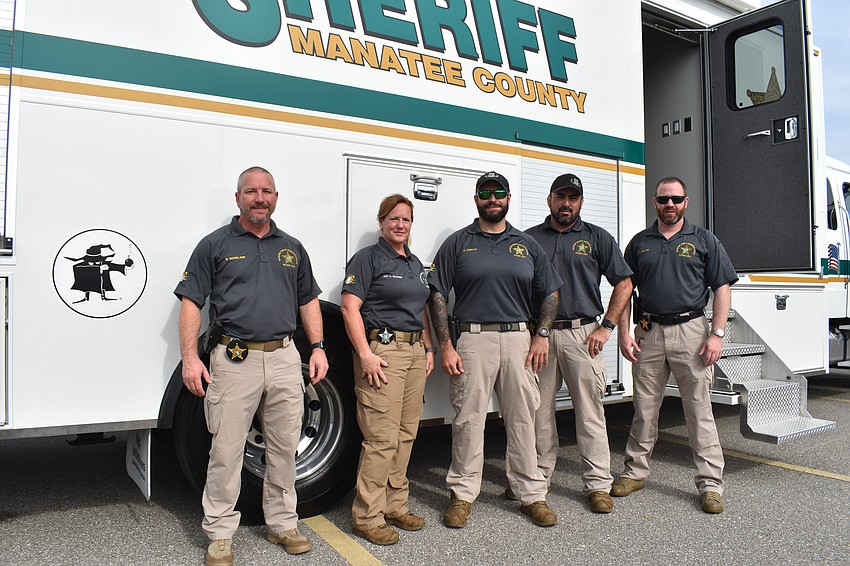- April 18, 2025
-
-
Loading

Loading

Upon the report of a bomb threat, the biggest worry for members of the Manatee County Sheriff's Office Bomb Squad isn't that they have to deal with a possible bomb.
That's part of their training.
“The scariest thing is not knowing exactly what it is you have,” Detective Brian Moreland said. “Once you know what you’re dealing with, tensions ease at that point. Then, we can collaborate as a team and figure out what the best course of action is to defeat that device.”
They go to work with uncertainly, so the last thing they want to worry about is their protective suit.
On Feb. 27, the Manatee County Commission approved a $170,000 grant to buy four new bomb suits.
The department has four suits now that are nearing the end of their effective lives. Bomb suits need to be replaced every five to seven years. The material stretches over time from sweat and sun exposure, making the suits less effective.
Public Information Officer Randy Warren said it's important to have the right gear to train with and to be prepared if there's ever a major incident that requires multiple people to suit up at once.
Bomb squad suits are made of kevlar, the same material used in bulletproof vests. The suits are stiff from hard panels that protect the arms, legs and chest.
Tapping on the chest panel feels and sounds like knocking on a door, but the suits are flexible enough to allow law enforcement officers to move, such as diving to the ground, if necessary.
Each suit weighs about 80 pounds, and with the helmet and additional equipment, goes to 100 pounds. The helmet comes with a defogger, lights, a ventilation fan and amplifiers to increase the slightest ambient noise.
“If I hear something, clicking or ticking, it’s important to know,” Deputy Carlos Dasilva said. “I might need to get out of there.”
The remote control for the helmet is attached to the sleeve of the suit, so each feature can be easily adjusted.
The suits are a necessary safety measure to have on hand, but remote control robots are always the first choice.
“We try to stay remote as much as possible,” Dasilva said. “If we can’t stay remote, then we’re going to the suit.”
The suits are only rated for a certain amount of blast wave pressure and don’t cover the hands or feet. Gloves, especially, would hinder dexterity.
If a bomb detonates too close to a law enforcement officer, a suit won’t always save a life, but the suits are designed to protect the wearer from fire, bullets and fragmentation.
There’s a good reason why bomb squad members don't turn their back to a bomb.
“If they take detonation, they’re going to have all that front-end protection,” Dasilva said. “There’s not as much protection in the back.”
A back support in the suit provides the maximum amount of absorption to prevent spinal cord injuries if blown backward.
Working on the bomb squad requires 280 hours of yearly training. Dasilva said that’s when the suits are most frequently used, but they do get used in the field.
A suit was used in August 2022 after a Fifth Third Bank in Parrish was robbed. The robber said he had a bomb, dropped a package and fled.
In that case, the robot wasn’t going to be able to open the door to the bank, so a person had to enter to take an X-ray of the package. The bomb turned out to be a hoax, but every threat is considered to be a bomb until it’s been determined not to be a bomb.
Despite the name, the bomb squad deals with a lot more than just bombs. The squad works with HAZMAT and SWAT teams. They retrieve grenades, bulk amounts of commercial fireworks and homemade explosives.
“That’s the No. 1 threat to us — disposal operations,” Moreland said. “(The job) is not necessarily what you see in the movies.”
In 2019, the bomb squad responded to a call in Terra Ceia. A homeowner found 38 pounds of dynamite inside a 7-foot PVC pipe floating in the canal behind his house.
The explosives were determined to be from the 1970s. They were most likely used to clear the mangroves and form channels.
One of the clues was wadded up newspaper stuffed inside the pipe to keep the pieces of dynamite from sliding around. If Detective James Parrish’s memory serves him, the newspaper was dated 1972.
The pipe was transported to a farm off Buckeye Road and safely detonated.

In addition to Manatee County, the six-member bomb squad services Highlands and Hardee counties was well.
“It’s so expensive to have and maintain a bomb squad,” Parrish said. “So we handle all the calls out there.”
The Federal Bureau of Investigation oversees all bomb squads and dictates how many bomb technicians each team can have. The minimum is four, but Parrish said other teams have 14 members.
Beyond being heavy, the suits get extremely hot. They can only be worn for about 30 minutes. On a hot summer day, that time could be cut in half before the wearer has to cool down.
Not being able to wear a bomb suit has ruled out applicants looking to join the team. Dasilva described wearing one as cumbersome and overbearing. It takes at least two people to put one on.
“You’re walking a minimum of 300 feet before you’re even in proximity of the package,” he said. “That’s a long walk there, doing work, bending over, kneeling down, picking things up — you’re doing basic stuff, but you’ve got about 90 pounds of equipment on.”
The mental fortitude to stay inside a bomb suit is as trying as the physical requirements. Applicants have become claustrophobic.
Remaining calm under pressure is a clear prerequisite for handling explosives.
“You’ve got to be somebody who likes to think logically, pull things apart and put them back together,” Dasilva said. “None of us on this team, by any means, are cowboys. We’re not out there trying to do anything reckless.”